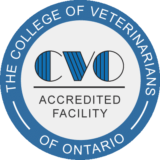UGVS Newsletter – June 2022
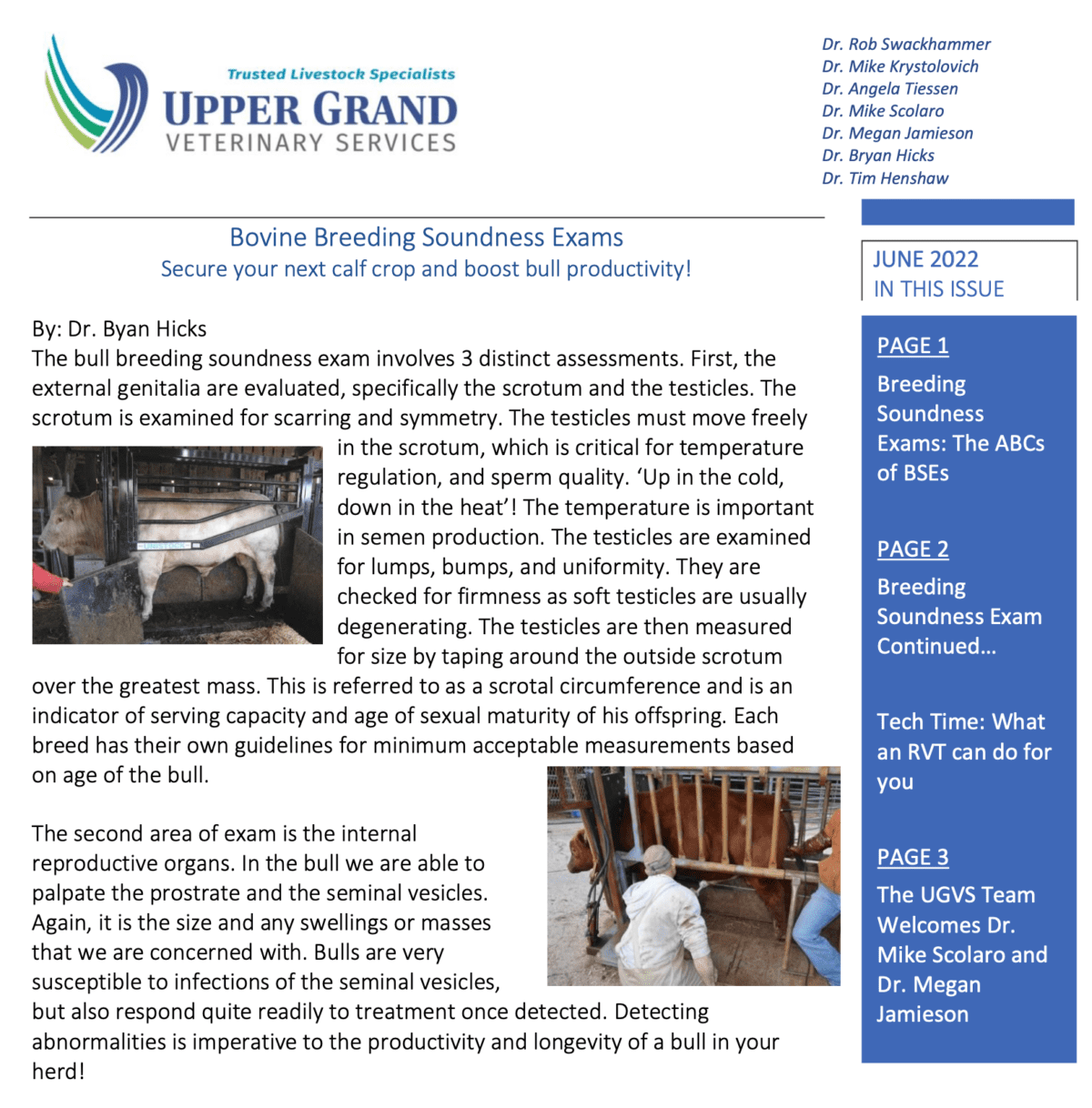
Bovine Breeding Soundness Exams
Secure your next calf crop and boost bull productivity!
By: Dr. Byan Hicks
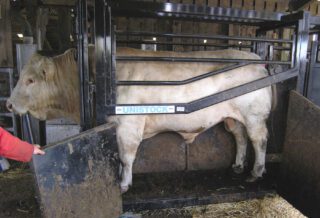 The bull breeding soundness exam involves 3 distinct assessments. First, the external genitalia are evaluated, specifically the scrotum and the testicles. The scrotum is examined for scarring and symmetry. The testicles must move freely in the scrotum, which is critical for temperature regulation, and sperm quality. ‘Up in the cold, down in the heat’! The temperature is important in semen production. The testicles are examined for lumps, bumps, and uniformity. They are checked for firmness as soft testicles are usually degenerating. The testicles are then measured for size by taping around the outside scrotum over the greatest mass. This is referred to as a scrotal circumference and is an indicator of serving capacity and age of sexual maturity of his offspring. Each breed has their own guidelines for minimum acceptable measurements based on age of the bull.
The bull breeding soundness exam involves 3 distinct assessments. First, the external genitalia are evaluated, specifically the scrotum and the testicles. The scrotum is examined for scarring and symmetry. The testicles must move freely in the scrotum, which is critical for temperature regulation, and sperm quality. ‘Up in the cold, down in the heat’! The temperature is important in semen production. The testicles are examined for lumps, bumps, and uniformity. They are checked for firmness as soft testicles are usually degenerating. The testicles are then measured for size by taping around the outside scrotum over the greatest mass. This is referred to as a scrotal circumference and is an indicator of serving capacity and age of sexual maturity of his offspring. Each breed has their own guidelines for minimum acceptable measurements based on age of the bull.
The second area of exam is the internal reproductive organs. In the bull we are able to palpate the prostrate and the seminal vesicles. Again, it is the size and any swellings or masses that we are concerned with. Bulls are very susceptible to infections of the seminal vesicles, but also respond quite readily to treatment once detected. Detecting abnormalities is imperative to the productivity and longevity of a bull in your herd!
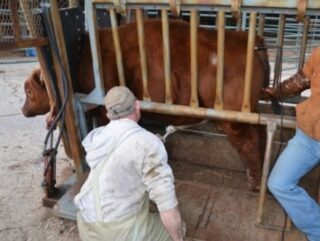 Lastly, the veterinarian evaluates a semen sample from the bull. Yearling and young bulls quite often will donate a sample for examination while the pelvic exam is being performed. Older bulls will donate as well with a longer time massage of the seminal vesicles. This is referred to as manual collection. For those bulls that don’t want to cooperate we have an electronic method of collection which is exactly as it sounds. Once collected, the semen is examined under a microscope for movement (motility), normality (morphology) and percent alive. In any sample not every sperm is normal, alive, and moving normally BUT if the percentages are high enough then the bull receives a pass. If a detailed certificate is required, the sample is stained, and the numbers recorded.
Lastly, the veterinarian evaluates a semen sample from the bull. Yearling and young bulls quite often will donate a sample for examination while the pelvic exam is being performed. Older bulls will donate as well with a longer time massage of the seminal vesicles. This is referred to as manual collection. For those bulls that don’t want to cooperate we have an electronic method of collection which is exactly as it sounds. Once collected, the semen is examined under a microscope for movement (motility), normality (morphology) and percent alive. In any sample not every sperm is normal, alive, and moving normally BUT if the percentages are high enough then the bull receives a pass. If a detailed certificate is required, the sample is stained, and the numbers recorded.
Why semen evaluate your bull? Young bulls need to be proven semen providers. Approximately 10% fail the test. Older proven bulls will undergo changes during the winter months that affect semen quality. It’s better to find these problems before the breeding season, rather than at fall pregnancy check time.
Have any interest to have a veterinarian out to perform a breeding soundness exam on your farm? Please call our office to schedule an appointment!
What can an RVT do?
A Registered Veterinary Technician is also known as being a nurse for animals, but did you know they can do so much more? Though they cannot diagnose diseases, they are an essential part of the team at vet clinics and a valuable asset to producers. Below is a list of some of the different tasks/roles a RVT can do.
 Blood sampling on calves; monitoring Total Protein to assess passive transfer of immunity
Blood sampling on calves; monitoring Total Protein to assess passive transfer of immunity- Perform nonsurgical castration
- Lab work; running fecal tests and bloodwork
- Dehorning calves
- Administer reproductive hormones and vaccines
- Body Condition Scoring of cows
- Herd Health data entry
- Developing templates for calf records
- Assisting veterinarians with CFIA charting and submissions
If you have further questions regarding what an RVT can do for your herd, please contact our office to have these questions addressed!
Meet Our Two Newest Members!
Dr. Mike Scolaro
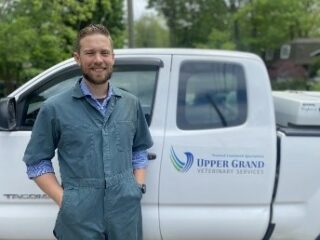 Some of you may have gotten a chance to meet Mike already, he started with the Upper Grand Veterinary Services team early May 2022. Mike is passionate about working with producers to help them maximize the health of animals and economic returns on-farm. Graduating the Ontario Veterinary College in 2022, Mike focused on bovine medicine, with a keen interest in problem solving and consulting. A significant portion of his clinical year was spent in western Canada, learning beef and dairy medicine from the best in Alberta and British Colombia. Mike’s drive and vision have already been recognized by the American Association of Bovine Practitioners, and in 2020 he was awarded the Amstutz Scholarship for his character, knowledge, experience, and motivation to become an outstanding bovine veterinarian. Mike’s attitude towards production medicine is “to make the world a better place for people and the animals we work with”. Mike currently lives in Guelph, and when not working, can be found hiking, cycling, and running with his dog, Dora.
Some of you may have gotten a chance to meet Mike already, he started with the Upper Grand Veterinary Services team early May 2022. Mike is passionate about working with producers to help them maximize the health of animals and economic returns on-farm. Graduating the Ontario Veterinary College in 2022, Mike focused on bovine medicine, with a keen interest in problem solving and consulting. A significant portion of his clinical year was spent in western Canada, learning beef and dairy medicine from the best in Alberta and British Colombia. Mike’s drive and vision have already been recognized by the American Association of Bovine Practitioners, and in 2020 he was awarded the Amstutz Scholarship for his character, knowledge, experience, and motivation to become an outstanding bovine veterinarian. Mike’s attitude towards production medicine is “to make the world a better place for people and the animals we work with”. Mike currently lives in Guelph, and when not working, can be found hiking, cycling, and running with his dog, Dora.
Dr. Megan Jamieson
 We welcome back Megan Jamieson early this June as she starts her veterinary career. Megan is a 2022 graduate from the Michigan State University College of Veterinary Medicine. She grew up on the Six Nations Reservation in Ontario and received her Bachelor of Science degree from the University of Guelph in 2016. Megan is very passionate about bovine and small ruminant medicine with specific interest in reproduction, herd health, and milk quality. Her passion for agriculture began after working on multiple dairy farms and a purebred sheep farm in Ontario prior to applying for vet school.
We welcome back Megan Jamieson early this June as she starts her veterinary career. Megan is a 2022 graduate from the Michigan State University College of Veterinary Medicine. She grew up on the Six Nations Reservation in Ontario and received her Bachelor of Science degree from the University of Guelph in 2016. Megan is very passionate about bovine and small ruminant medicine with specific interest in reproduction, herd health, and milk quality. Her passion for agriculture began after working on multiple dairy farms and a purebred sheep farm in Ontario prior to applying for vet school. 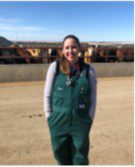 During her vet school career, Megan gained a tremendous amount of experience working with livestock operations in Michigan, Idaho, New York, Alberta, and Ontario. She is excited to bring all of the knowledge and experience she has gained in her travels back home to help producers in Ontario. In her spare time, she enjoys fishing, cottaging, working out, live music, and spending as much time as she can with family and friends.
During her vet school career, Megan gained a tremendous amount of experience working with livestock operations in Michigan, Idaho, New York, Alberta, and Ontario. She is excited to bring all of the knowledge and experience she has gained in her travels back home to help producers in Ontario. In her spare time, she enjoys fishing, cottaging, working out, live music, and spending as much time as she can with family and friends.


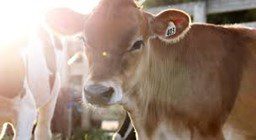 Blood sampling on calves; monitoring Total Protein to assess passive transfer of immunity
Blood sampling on calves; monitoring Total Protein to assess passive transfer of immunity
